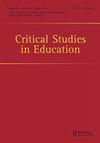Pathways to progress? – collective conscientisation and progressive school reform in Aboriginal education
IF 4
2区 教育学
Q1 EDUCATION & EDUCATIONAL RESEARCH
引用次数: 0
Abstract
Setting in train various forms of curriculum and pedagogic change in schools whilst seeking to improve both teaching strategies and Aboriginal educational outcomes in Australia is a complex business. This involves a sustained effort to equip the next generation of educators with the skills and knowledges to identify, diagnose, and devise remedies for the ‘problems’ that are sometimes ascribed to Aboriginal learners. The work of Paolo Freire is a point of reference here. However, the halo around Freire and his work may occlude thinking about how to evoke his concepts, (specifically conscientisation) in the contemporary Australian context. We discuss the strengths and weaknesses of Freire’s work in this light. We also discuss the Culturally Nourishing Schooling (CNS) project, a whole school reform model where teachers are encouraged to shift their reflective gaze onto themselves and on the settings in which they work. We argue that for ‘success’ in education to no longer be defined by deficit thinking, firstly, conscientisation must be a collective process. To change teachers and their practice and schooling requires a different conception of both change and of conscientisation.进步之路?-土著教育的集体责任感和进步的学校改革
在澳大利亚,在寻求改进教学策略和土著教育成果的同时,在学校设置各种形式的课程和教学变革是一项复杂的工作。这需要持续的努力,使下一代教育工作者具备识别、诊断和设计解决“问题”的技能和知识,这些问题有时被认为是土著学习者的问题。保罗·弗莱雷的作品是这里的一个参考点。然而,围绕Freire和他的作品的光环可能会阻碍思考如何在当代澳大利亚的背景下唤起他的概念(特别是责任心)。我们从这个角度来讨论弗莱雷作品的优点和缺点。我们还讨论了文化滋养学校(CNS)项目,这是一个鼓励教师将反思的目光转向自己和他们工作的环境的整个学校改革模式。我们认为,要使教育中的“成功”不再由缺陷思维来定义,首先,尽责必须是一个集体过程。要改变教师,改变他们的实践和学校教育,需要对改变和尽责有不同的概念。
本文章由计算机程序翻译,如有差异,请以英文原文为准。
求助全文
约1分钟内获得全文
求助全文
来源期刊

Critical Studies in Education
EDUCATION & EDUCATIONAL RESEARCH-
CiteScore
10.10
自引率
5.10%
发文量
18
期刊介绍:
Critical Studies in Education is one of the few international journals devoted to a critical sociology of education, although it welcomes submissions with a critical stance that draw on other disciplines (e.g. philosophy, social geography, history) in order to understand ''the social''. Two interests frame the journal’s critical approach to research: (1) who benefits (and who does not) from current and historical social arrangements in education and, (2) from the standpoint of the least advantaged, what can be done about inequitable arrangements. Informed by this approach, articles published in the journal draw on post-structural, feminist, postcolonial and other critical orientations to critique education systems and to identify alternatives for education policy, practice and research.
 求助内容:
求助内容: 应助结果提醒方式:
应助结果提醒方式:


